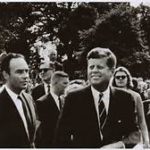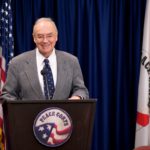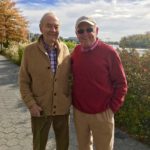Ethiopia’s First Peace Corps Staff, Part Three
Harris Wofford was born in Johnson City, Tenn., and raised in Scarsdale, N.Y. While still in high school, he founded and became the first president of the Student Federalist Movement, after he was inspired by Clarence Streit’s Union Now.
Enrolled in the University of Chicago’s accelerated student’s plan, he took Chicago’s famed great books curriculum and received his degree in two yers, after which he became the first holder of an accelerated degree to be admitted to Yale University Law School.
He also became the first White student to be admitted to Howard University Law School since suffragette days when some White women sought to dramatize their demands for the vote by enrolling there.
In 1954, he received law degrees from both Yale and Howard. In 1948, the year in which he graduated from Chicago, Wofford attended a World Youth Festival in Prague which he also covered in three articles for the New York Herald Tribune.
With his wife, the former Clare Lindgren of St. Paul, he spent most of 1949 in India studying village economics and the Ghandian movement, a journey that resulted in the book India Afire, published by John Day in 1951. The summer of 1950, the Woffords spent in Israel, he working as a farmer, she in the collective laundry of a kibbutz. The year 1953-54, Wofford served as a special assistant to Chester Bowles and in 1957, he accompanied Mr. and Mrs. Bowles on a trip to India, Pakistan, Afghanistan, the Soviet Union, Poland and Yugoslavia.
Meanwhile, he had joined the Washington, D.C., law firm of Covington and Burling where he remained until 1959, when he was named a full-time staff member of the Civil Rights Commission.
 He continued for another year as counsel to the Commission and as legal adviser to the Rev. Theodore Hesburgh, a member of the Commission and president of Notre Dame. In 1960, he became an assistant to then Senator John Kennedy and joined his campaign for the presidency. In February, 1961, he was named Special Assistant to the President, charged with advising him on civil rights matters and the Peace Corps.
He continued for another year as counsel to the Commission and as legal adviser to the Rev. Theodore Hesburgh, a member of the Commission and president of Notre Dame. In 1960, he became an assistant to then Senator John Kennedy and joined his campaign for the presidency. In February, 1961, he was named Special Assistant to the President, charged with advising him on civil rights matters and the Peace Corps.
After he moved full-time to the Peace Corps in May, 1962, Wofford remained in Washington for the summer to help with the largest training program to date. More than 300 prospective Volunteers for Ethiopia moved onto the campus of Georgetown University in June, of whom 278 were selected to go overseas.


I met Harris Wofford in 1963 when he came to my home in Mekelle and spent the night drinking beer and consoling a PCV who was suffering from severe culture shock. The volunteer was in his thirties and an experienced teacher. Wofford convinced him that he was too valuable to be sent home. A transfer was quickly arranged to transfer him to Asmara in Eritrea where this volunteer completed his two years of assignment.